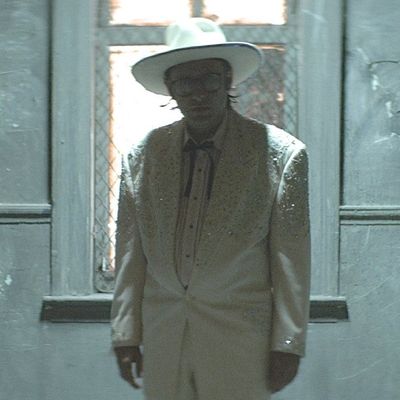
A torturously extended portrait of a comedian (Gregg Turkington) at the end of his tether, his talent, and his very culture, Rick AlversonÔÇÖs Entertainment struck me when I saw it last spring as one of the most pretentious, pointlessly grating movies ever made. But the seasons passed, the memory of my pain faded, and certain images remained anchored in my mind. I hadnÔÇÖt previously been acquainted with TurkingtonÔÇÖs alter ego, an abrasively unfunny, sexist (and every other ÔÇôist) stand-up comedian named Neil Hamburger. Listening to other Hamburger performances, I came to admire the audacity of AlversonÔÇÖs conceit: to take this greasy, unprepossessing, essentially one-joke figure and build an existential tragedy around him. I began to worry that my bourgeois expectations of comfort had gummed up my responses, that Alverson and Turkington had made an authentically punk art movie.
Sadly, I loathed it almost as much the second time, though I do feel more confident taking its measure.
Alverson has put this stunted, disagreeable little man in the widescreen desert of Antonioni, where Neil becomes the vehicle for examining the skeletal remains of a snobbish, viciously exploitative America. The setting does much of the work: California, somewhere west of Bakersfield, a baked, arid nowhere with the odd, incongruous orange grove (with Mexican laborers) to remind us that a determined capitalist can pipe water anywhere.
Are you familiar with Neil Hamburger? He wears a shabby suit, vest, and a flower in his lapelÔÇöheÔÇÖs a zombie disinterred from a vaudeville past. HeÔÇÖs not like that offstage; he creates himself each night. We see him carefully mat down his hair and separate it into strands, which he plasters against his scalp to suggest the worldÔÇÖs ugliest comb-over. He comes to the stage bearing three beveragesÔÇöwater bottles or cocktails, one for drinking and two tucked into the crook of his arm.
Most distinctive are his vocal stylings. In between attempts to clear his throat that sound as if hes gargling with a gallon of phlegm, he delivers riddles in a querulous yowl, spacing out each word as if to abrade his audiences eardrums: Why  Why  Why does Madonna feed her baby Alpo brand dog food?  Because thats what comes out of her breasts. Actually, thats one of his more conventionally offensive jokes. Many of them dont even have recognizable punchlines. Hecklers, meanwhile, are met with protracted tongue-lashings, in which he trumpets his righteous indignation, having carried, he says, his jokes many miles to bestow them on people who crave entertainment as a respite from their miserable little lives.
When not inciting his small, unenthusiastic audiences in dingy bars (and, in the first sequence, a prison), he troops stonefaced (though palpably sad) on guided toursÔÇöan airplane graveyard, a drained oilfield. He hallucinates scenes in which he strides through a motel, a prison, and a TV studio in a white suit and cowboy hat. In the evening he sits on his bed in dingy rooms, leaving tender phone messages for his daughter, Maria. Her name is not arbitrary. There are three Marias in the film. ÔÇ£Ave MariaÔÇØ runs over the closing credits. Neil is desperate for salvation.
Entertainment is 90 percent Turkington, but other figures dot this barren landscape. John C. Reilly turns up as NeilÔÇÖs cousin, a rancher, orange-grove owner, and proselytizing capitalist who boasts about the size of his property (Who would want it? Nothing grows) and whose Mexican wife (or concubine) and her father speak openly (in a language he canÔÇÖt understand) of killing him. An eerily unfunny silent acrobatic young clown (Tye Sheridan) opens for Neil. An alluring ÔÇ£chromotherapistÔÇØ (Lotte Verbeek) turns up in a mystical interlude to suggestÔÇövia slides of color that fill the screenÔÇöa world elsewhere. A scene in which Neil holds a freshly-stillborn baby and its bloody afterbirth is merely grotesque, its primal horror unearned. Apart from an ingratiatingly wobbly vocal on the soundtrack by one Leah Devorah, the most affecting thing in Entertainment is the face of Amy Seimetz as an inebriated bar-goer who inadvertently interrupts NeilÔÇÖs set, prompting a vile tirade invoking sexually-transmitted disease and its attendant excretions. Her mask of pain is the most recognizably human image in the movie.
Neil is quite a characterÔÇöheÔÇÖs unforgettable. But he doesnÔÇÖt have the stature for tragedy, and Alverson loiters over every scene as if to rub our noses in the inaptness of the title. You can almost hear Kurt Cobain mocking his audience with the cry, ÔÇ£Entertain us!ÔÇØ Except Cobain didnÔÇÖt punish us with unlistenable songs. Entertainment wears its contempt too arrogantly, fulsome in its emptiness.


